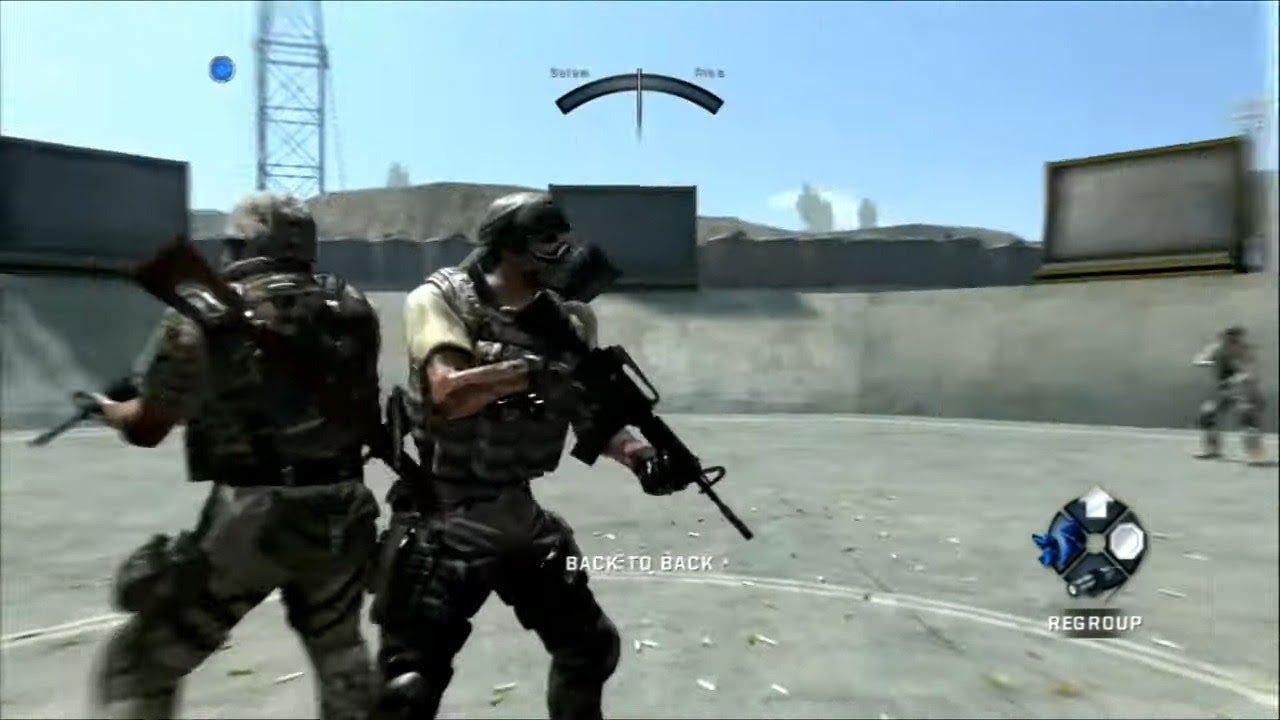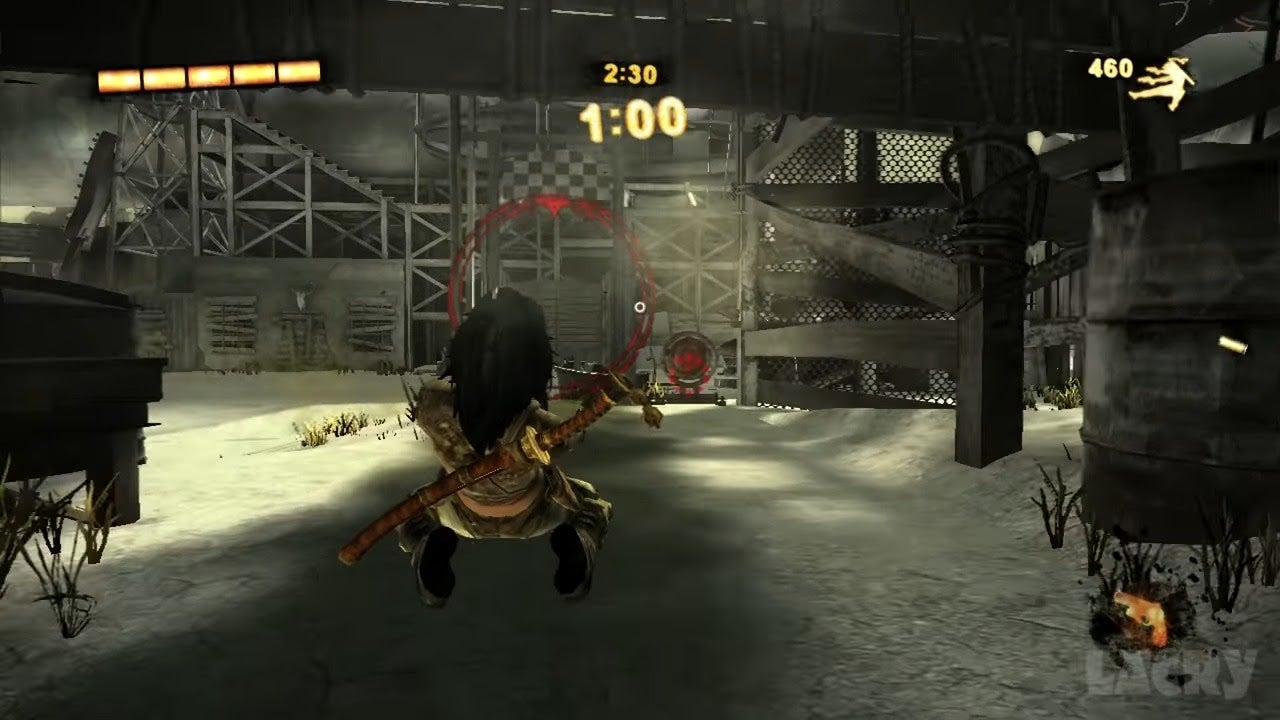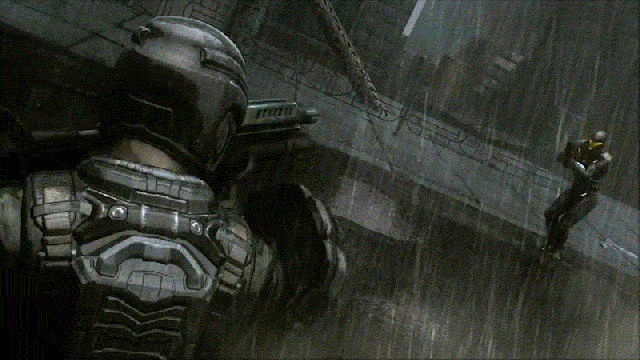In the late ‘00s, before every game became a MOBA and then pivoted to become a battle royale, it seemed like every other game was a shooter with some sort of gimmick to make it stand out from the Calls of Duty and Battlefields. From gravity manipulation to doing drugs, here’s a bunch of the oddball gimmicks developers came up with to sell us on their mid-budget manshoots.
The mid-to-late aughts were a great time for shooter fans, with new ways to kill a whole bunch of samey enemies dropping on a regular basis. It seemed like publishers were pushing through anything with fast-paced gunplay. To really shine, a game had to either be incredibly good or embrace some sort of eye-catching hook.
Since the Entertainment Software Ratings Board frowns on eye-catching hooks, many games implemented unique or not-so-unique gimmicks instead. Despite the flashy stunts games like TimeShift and Fracture employed, many of you are probably considering looking up TimeShift and Fracture on Wikipedia right now. Don’t worry, we’ve got you covered.
With that said, let’s shoot some guns, do some drugs, and completely break the laws of space and time.
Haze: The One With All The Drugs
We start with a game so forgettable that by the time you reach the end of this article you’ll have to come back for a refresher. Developer Free Radical Design is best known for the delightful time-travelling TimeSplitters series, but towards the end of its run it teamed with Ubisoft for 2008’s Haze, a game about doing drugs and shooting guns. Haze takes place in a dystopian future where soldiers are enhanced by a chemical substance called Nova-Keto-Thyrazine, better known as Nectar. Taking Nectar gives soldiers a power boost but also applies a hallucinogenic effect, transforming battlefields into painless, idyllic environments.
What an amazing concept. Imagine fighting through a battle without knowing it, only to have your drug injector fail and reveal the ugly truth in shocking fashion. Handled correctly, that sounds like a concept that would make for an outstanding video game. It was not handled correctly, and now Haze is remembered as that one game with the yellow helmet on the cover, when it’s remembered at all.
TimeShift: The One That Actually Shifted Through Time
Originally slated for release from Atari in early 2006, publishing rights to Saber Interactive’s TimeShift switched to Sierra in April of that year and was delayed multiple times. By the time the game was released in late 2007, Sierra had been bought by Vivendi and the shooter fans that had been eagerly anticipating TimeShift a year earlier had all but forgotten it existed, which is for the best, as the game was completely overhauled following the poor reception of its 2006 demo. Saber announced the overhaul in April of 2007, yet somehow the game still managed to come out a few months later. Weird.
As if the name didn’t make it clear, TimeShift’s big gimmick is the ability to slow, stop, and rewind time. You achieve this with a special suit, because as Crysis taught us, special suits are cool. Also cool is the idea of tossing a time grenade into a group of enemies and then firing bullets into the bubble that hangs in the air until the time-stopping effect fades. So yes, the idea was cool. In practice, the whole game was just kind of ok. The best thing to come of TimeShift was this spooky trailer for a much more exciting game:
Fracture: The One With The Movable Terrain
Day 1 Studio’s 2008 third-person shooter Fracture has one of the coolest gimmicks on this list. The ability to raise and lower terrain more-or-less at will using a variety of high-tech weaponry is super cool. Digging into the ground to escape a sticky situation, creating your own barricades via technologically-enabled Earthbending, and using these terrain-transforming powers to solve puzzles is a blast. If my badly broken review is any indication, I had a great time with all of those special abilities.
Unfortunately, Fracture also had repetitive enemies, a bland story, and main character named Jet Brody whose bald head should be in the generic shooter hero hall of fame. Despite its cool gimmick, it was quickly forgotten.
Singularity: The One With The Time Manipulation Device
One of my favourite games on the list, Raven Software’s 2010 Singularity is a tasty bite of Cold War-era espionage with a time-travel twist. A helicopter carrying a group of U.S. Marines is hit by a mysterious energy wave, causing it to crash land on an island once held by the former Soviet Union. Surviving the crash, Captain Nathaniel Renko begins to phase between modern day and 1955. During one of these trips he saves a Soviet scientist, only to return to the present to find that scientist has taken over the world. Using a special TMD (Time Manipulation Device), Renko must jump back and forth between timelines to set things straight.
The TMD lets Renko manipulate the temporal state of living creatures (unless they’re wearing armour) or physical objects that have come into contact with an element called E-99. During his adventure Renko discovers power stations that boost the TMD, allowing him to affect larger objects, making the game sort of a Metroidvania where paths are blocked until you reach certain power levels.
Singularity’s a great game with a neat gimmick that was released with hardly any marketing and has since been pretty much forgotten. I recall it fondly when I recall it at all.
Inversion: The One Where You Manipulate Gravity
One of the latest games on this list, Inversion was released in 2012 by Bandai Namco and Saber Interactive, the same development studio behind TimeShift. It seems like Saber really wanted gimmicky shooters to be its thing, and so we got the generic-feeling third-person cover shooter that’s not technically a cover shooter. The aliens invading Earth in Inversion have the power to manipulate gravity, a power that falls into the hands of completely forgettable police officer Davis Russell. The newly empowered Davis can create areas of anti-gravity, making his enemies float out of cover where they’re easier to shoot. He can also enhance gravity, bringing floating obstacles crashing down on foes’ heads.
It’s basically like Gears of War, only much easier because Davis can make enemies float. Aside from trying to make you dizzy by having you fight on the sides of buildings or on ceilings, Inversion didn’t do a lot with what it had, and now Saber Interactive mainly does ports and remasters of other developers’ games.
The Darkness: The One With The Tentacles, Demons, And Feelings
Starbreeze Studios’ The Darkness, based on the Top Cow comic series of the same name, is one of the best first-person shooters ever made. As an FPS it’s as proficient as they come, with powerful, impactful gunplay. Its story features one of the most beautiful scenes in gaming, in which protagonist Jackie Estacado sits on a couch and watches the movie To Kill a Mockingbird while his girlfriend falls asleep with her head on his shoulder. If The Darkness were just a normal shooty game with its powerful story beats, it still would have been a memorable experience.
But it also has the titular Darkness, an evil supernatural force that possesses Jackie, allowing him to spawn writhing tentacles capable of grabbing enemies and devouring their hearts, or summon imps to take out bad guys in his stead. The game perfectly balances its gunplay and tentacle play (perhaps the wrong term), but I’m still going to call the tentacles a gimmick because it means I get to mention The Darkness.
Lost Planet: Extreme Condition: The Cold One
Capcom’s 2006 sci-fi shooter Lost Planet: Extreme Condition features the most annoying gimmick on this list: freezing to death. In the distant future, after ruining Earth with pollution and global warming, humanity seeks to colonise a planet called E.D.N. III. Unfortunately, E.D.N. III is already inhabited by the insectoid Akrid. It is also in the grips of a brutal ice age.
The Akrid aren’t that much of an issue. The bigger ones have large glowing orange weak points for protagonist Wayne Holden to aim at. The problem is the cold, and how it makes you have to constantly seek out something called T-Eng in order to keep from freezing to death. It’s a pointless, annoying gimmick that had barely any bearing on the rest of the gameplay. When Lost Planet 2 came out in 2010, the T-Eng malarky was nowhere to be found. Good riddance. I only like warm gimmick shooters.
Army of Two: The One With Best Friends Forever
While most shooters tend to be built around making you an army of one, 2008’s Army of Two is all about friendship and cooperation between a pair of soldiers who really should have been romantically involved. Elliot Salem and Tyson Rios deeply need each other. Sometimes they need each other to open heavy doors, or flank enemies, or provide cover. During particularly romantic situations the pair can go back-to-back, which doesn’t really seem like it would help much in a situation where two people were surrounded by enemies with guns, but somehow it did.

Were Army of Two’s co-op play a mere suggestion, it wouldn’t be on this list. But buddy action is the core gameplay mechanic here. You have to be friends, whether with another live player or the AI, to get through the game. I think it’s kind of sweet, really.
Area 51: The One With The Alien Mutation
Not to be confused with its loosely related follow-up, Blacksite: Area 51, 2005’s Area 51 is a first-person shooter that is itself loosely based on the 1995 arcade light-gun shooter of the same name. Area 51’s gimmick is not its confusing pedigree. Partway through the game protagonist Ethan Cole is infected with an alien mutagen, granting him the ability to temporarily transform into a mutant himself. As a low-key monstrosity, Cole gains increased stamina, the power to easily spot cloaked enemies, health-enhancing parasites he can fire at enemies, and other fun alien stuff.
Ethan’s coolest power, however, was that his voice sounded just like actor David Duchovny, due to his being voiced by actor David Duchovny.
Wet: The Slippery One
No list of gimmick shooters is complete without a visit to Bethesda Softworks and Behaviour Interactive’s 2009 grindhouse bloodfest, Wet. Buffy’s Eliza Dushku stars as Rubi Malone, a completely unlikable mercenary who cuts a bloody path through the forces of a powerful drug lord with her sword and dual pistols. Basically, she really wants to be Dante from Devil May Cry. At times her battles get so bloody that Rubi launches into a berserker rage. The screen goes white, black, and red as she becomes faster and stronger. But the wetter she gets, the deader her enemies get. I cannot believe I just wrote that.

The whole blood thing isn’t Wet’s only gimmick. This is an acrobatic shooter, which means Rubi can run, jump off walls, and slide everywhere, firing her guns all the while. If you don’t take the game too seriously, it’s a slippery good time.

Leave a Reply